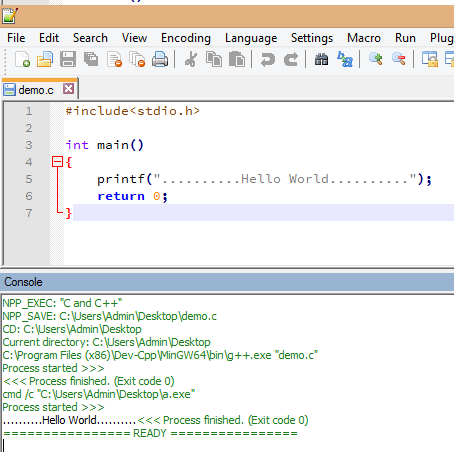In C++, you can exit a program in these ways:
- Call the exit function.
- Call the abort function.
- Execute a return statement from
main.
exit function
Nov 29, 2016 Delphi is the ultimate IDE for creating cross-platform, natively compiled apps. Are you ready to design the best UIs of your life? Our award winning VCL framework for Windows and FireMonkey (FMX) visual framework for cross-platform UIs provide you with the foundation for intuitive, beautiful.
The exit function, declared in <stdlib.h>, terminates a C++ program. The value supplied as an argument to exit is returned to the operating system as the program's return code or exit code. By convention, a return code of zero means that the program completed successfully. You can use the constants EXIT_FAILURE and EXIT_SUCCESS, also defined in <stdlib.h>, to indicate success or failure of your program.
Issuing a return statement from the main function is equivalent to calling the exit function with the return value as its argument.
abort function
The abort function, also declared in the standard include file <stdlib.h>, terminates a C++ program. The difference between exit and abort is that exit allows the C++ run-time termination processing to take place (global object destructors will be called), whereas abort terminates the program immediately. The abort function bypasses the normal destruction process for initialized global static objects. It also bypasses any special processing that was specified using the atexit function. Sq8l vst free download.
atexit function
Use the atexit function to specify actions that execute prior to program termination. No global static objects initialized prior to the call to atexit are destroyed prior to execution of the exit-processing function.
Explore 25+ Windows apps like Bloodshed Dev-C, all suggested and ranked by the AlternativeTo user community. Bloodshed Dev-C is a full-featured Integrated Development Environment (IDE) for the C/C programming language. It uses Mingw port of GCC (GNU Compiler Collection) as it's compiler. Alternatives to Bloodshed Dev-C for all platforms with any license Eclipse. Eclipse is an extensible development platform with runtimes and application frameworks. Microsoft Visual Studio. Microsoft Visual Studio is an integrated development environment (IDE). A free, open-source.
return statement in main

Issuing a return statement from main is functionally equivalent to calling the exit function. Consider the following example:

The exit and return statements in the preceding example are functionally identical. However, C++ requires that functions that have return types other than void return a value. The return statement allows you to return a value from main.
Destruction of static objects
When you call exit or execute a return statement from main, static objects are destroyed in the reverse order of their initialization (after the call to atexit if one exists). The following example shows how such initialization and cleanup works.
Example
In the following example, the static objects sd1 and sd2 are created and initialized before entry to main. After this program terminates using the return statement, first sd2 is destroyed and then sd1. The destructor for the ShowData class closes the files associated with these static objects.
Another way to write this code is to declare the ShowData objects with block scope, allowing them to be destroyed when they go out of scope:
See also
-->Controls conditional branching. Statements in the if-block are executed only if the if-expression evaluates to a non-zero value (or TRUE). If the value of expression is nonzero, statement1 and any other statements in the block are executed and the else-block, if present, is skipped. If the value of expression is zero, then the if-block is skipped and the else-block, if present, is executed. Expressions that evaluate to non-zero are

- TRUE
- a non-null pointer,
- any non-zero arithmetic value, or
- a class type that defines an unambiguous conversion to an arithmetic, boolean or pointer type. (For information about conversions, see Standard Conversions.)
Syntax
Example
if statement with an initializer
Visual Studio 2017 version 15.3 and later (available with /std:c++17): An if statement may also contain an expression that declares and initializes a named variable. Use this form of the if-statement when the variable is only needed within the scope of the if-block.
Example
In all forms of the if statement, expression, which can have any value except a structure, is evaluated, including all side effects. Control passes from the if statement to the next statement in the program unless one of the statements contains a break, continue, or goto.
The else clause of an if..else statement is associated with the closest previous if statement in the same scope that does not have a corresponding else statement.
if constexpr statements
Exit 0 In Dev C Free
Visual Studio 2017 version 15.3 and later (available with /std:c++17): In function templates, you can use an if constexpr statement to make compile-time branching decisions without having to resort to multiple function overloads. For example, you can write a single function that handles parameter unpacking (no zero-parameter overload is needed):
Exit 0 In C
See also
Exit 0 In Dev C Pdf
Selection Statements
Keywords
switch Statement (C++)